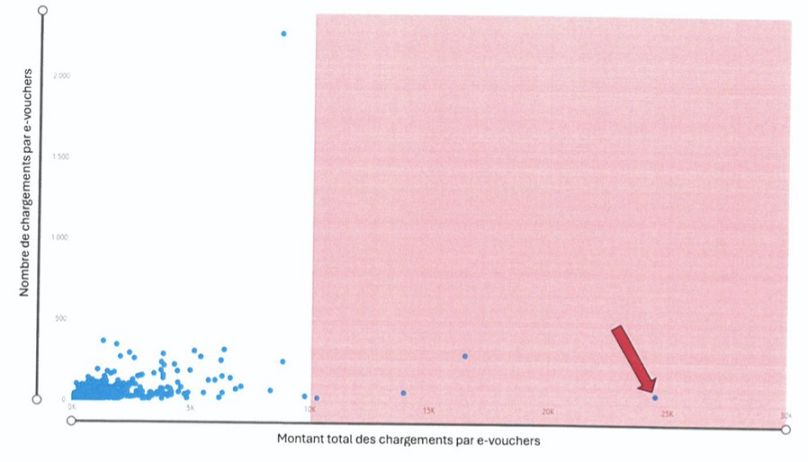Newly released National Lottery data shows how two suspicious accounts, presumably belonging to the ex-EU Commissioner and his wife, stuck out like a sore thumb, as they jointly splurged nearly €50,000 of lottery tickets in a year.
Former Belgian finance minister and ex-EU Justice Commissioner Didier Reynders was questioned by police on Tuesday, 3 December, concerning suspicions of money laundering in part carried out through the National Lottery.
He has denied criminal allegations made against him, saying the funds were from his private estate, and that he's helping the magistrate with inquiries.
But fresh information now released by the Belgian National Lottery in a document seen by Euronews shines a spotlight on how the alleged scam may have worked — or didn't.
The allegation is that Reynders and his wife purchased e-tickets: lottery vouchers worth as much as €100 that can be bought in physical shops before they are deposited in a player’s online account. Winnings can then be transferred into a regular bank account.
First problem: e-tickets aren't a big part of the lottery's business model, so high sales volumes drew a lot of attention. In 2024, out of 6500 points of sale, just four sold more than €10,000 of e-tickets, the National Lottery has said.
In 2021, regular checks by the Lottery — which is co-owned by the Belgian state and sovereign wealth fund — noted one single point of sale had sold a large number of tickets; further probes suggest those were linked to just two accounts, identified as being politically sensitive.
Out of over one million people that play the lottery, the 39 accounts that deposited over €20,000 per year rang an extra alarm bell internally, the Lottery said.
Exactly two accounts stuck out like a sore thumb: they each deposited nearly €25,000, and raised extra suspicions because they reloaded using high-value e-tickets, and largely transferred rather than reinvesting winnings.
Those two accounts, believed to be owned by Reynders and his wife, show up sharply on a remarkable chart issued by the National Lottery.
Public prosecutor was first notified in 2022
The National Lottery said that, after noting the suspicious behaviour, it enlisted KPMG to study it further, and by early 2022 concluded a risk of money laundering — a concern signalled to federal prosecutors in March 2022.
Prosecutors didn't respond with a request for further information until August 2023, the Lottery said — and in the meantime there were concerns that taking further action, such as freezing Reynders' account, would unduly raise suspicions.
It's not quite clear what explains that long hiatus — though the fact that prosecutors waited until just two days after Reynders' five-year Commission term ended suggested they were concerned he would benefit from some form of legal immunity due to his mandate.
The Brussels prosecutor-general has confirmed to Euronews the existence of the case, but declined to comment further.
Nor is it known what the police believe was the source of the allegedly illicit funds, which Belgian media has claimed are worth as much as €1 million, of which around 20% was reportedly funneled through the lottery.
Reynders, speaking through a lawyer, has said the funds came from his “private wealth” and are unrelated to his political duties.
He has also previously said accusations he accepted bribes while a Belgian minister were a "vicious attack" designed to stop him becoming an EU Commissioner, and they were not taken forward by prosecutors.
Casinos are well-known for attracting money-launderers due to the high usage of cash and relative anonymity. But lotteries are generally viewed as less of a problem.
The National Lottery itself points to relatively low payout rates and strict controls on deposits as evidence that they are not useful to would-be criminals.
The fact that Reynders' alleged behaviour drew such attention does suggest they may have a point, and that this is not an effective way for any wrongdoer to hide illicit funds.
Euronews' advice is simple: don't launder money, and if you do, definitely don't do it using the National Lottery.












